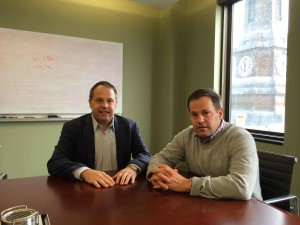The hedge fund twins accused of gaming up-to-congestion trades in PJM abruptly ended their public relations campaign against the Federal Energy Regulatory Commission last week, announcing they had taken down their website and would no longer talk to the media or at industry conferences.
Despite their earlier vow not to settle with FERC over the allegations, the move by Rich and Kevin Gates suggests that — after spending more than $1.5 million on lawyers and consultants fighting the investigation — they may be seeking to end hostilities.
Reached by phone Friday, Kevin Gates and Larry D. Gasteiger, acting director of FERC’s Office of Enforcement, both declined to comment.
Going on Offense
In March, after being the subject of a FERC investigation for more than three years without being charged, the brothers had decided to go on offense by launching a website on which they posted correspondence with FERC and opinions from energy experts that they said proved they were being unfairly hounded. The dispute became a case study for critics, including some former FERC officials, who say the agency has sought to punish legitimate, if opportunistic, trading.
The brothers hounded now-Commissioner Norman Bay, FERC’s former enforcement chief, through his Senate confirmation, spoke at industry conferences and won support from The Wall Street Journal editorial board.
In August, the day after Bay was sworn in as commissioner, FERC staff issued a notice of alleged violations accusing the brothers and their partners in the Powhatan Energy Fund of engaging in “manipulative” up-to-congestion trades in PJM in 2010. (See PJM UTC Case Likely Headed to Court After FERC Notice.)
FERC alleged that the brothers’ investment funds placed “millions of megawatt-hours of offsetting trades between the same two trading points, in the same volumes and the same hours” to capture line-loss refunds without facing any risk from the underlying trades.
Although FERC’s confidential preliminary findings challenged $4.7 million in profits the investors made between February and August 2010, the notice cited only trades made after June 1.
The Gates brothers said their trades were legal until the loophole they exploited was closed later in 2010. They vowed to fight the allegations and said they had rejected a previous settlement offer from FERC.
With the facts not in dispute, the case would have turned on legal interpretations: Were Gates’ trades riskless, and thus improper, “wash” trades, as FERC contends, or permissible “spread” trades? Did FERC provide proper notice that seeking profits through the line-loss rebates alone was improper? And if FERC thought it had a strong case, why did it wait nearly four years to bring it?
If there is no settlement, the next major step would likely be a commission vote on whether to issue an order to show cause. (On Oct. 6, the Gates brothers filed a motion seeking to force Bay to recuse himself from the case.)
William M. McSwain, attorney for the brothers, told RTO Insider in August that if the commission decided to proceed, the case would end up in a U.S. District Court where he said the merits would be reviewed by a “neutral decision maker.”
Based on last week’s disarmament, however, it appears the brothers may never get their day in court.
One company that engaged in similar trades, Oceanside Power, agreed to settle the charges against it by disgorging profits of $29,563 and paying a fine of $51,000 (IN10-5).
FERC staff also filed a notice of alleged violations in August against City Power Marketing and its principal, K. Stephen Tsingas, for a similar trading scheme. Tsingas and his attorney have declined to comment.




